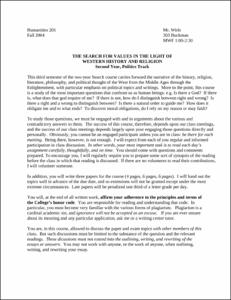Please use this identifier to cite or link to this item:
http://hdl.handle.net/10267/1623| Title: | HUM 201-04, The Search for Values in the Light of Western History and Religion, Fall 2004 |
| Authors: | Wirls, Stephen |
| Keywords: | Humanities;Syllabus;Curriculum;Academic departments;Text;2004 Fall |
| Issue Date: | 22-Aug-2004 |
| Publisher: | Memphis, Tenn. : Rhodes College |
| Abstract: | This third semester of the two-year Search course carries forward the narrative of the history, religion, literature, philosophy, and political thought of the West from the Middle Ages through the Enlightenment, with particular emphasis on political topics and writings. More to the point, this course is a study of the most important questions that confront us as human beings: e.g. Is there a God? If there is, what does that god require of me? If there is not, how do I distinguish between right and wrong? Is there a right and a wrong to distinguish between? Is there a natural order to guide me? How does it obligate me and to what ends? To discover moral obligations, do I rely on my reason or may faith? To study those questions, we must be engaged with and in arguments about the various and contradictory answers to them. The success of this course, therefore, depends upon our class meetings, and the success of our class meetings depends largely upon your engaging those questions directly and personally. Obviously, you cannot be an engaged participant unless you are in class: be there for each meeting. Being there, however, is not enough. I will expect from each of you regular and informed participation in class discussion. In other words, your most important task is to read each day’s assignment carefully, thoughtfully, and on time. You should come with questions and comments prepared. To encourage you, I will regularly require you to prepare some sort of synopsis of the reading before the class in which that reading is discussed. If there are no volunteers to read their contributions, I will volunteer someone. In addition, you will write three papers for the course (4 pages, 6 pages, 6 pages). I will hand out the topics well in advance of the due date, and so extensions will not be granted except under the most extreme circumstances. Late papers will be penalized one third of a letter grade per day. You will, at the end of all written work, affirm your adherence to the principles and terms of the College’s honor code. You are responsible for reading and understanding that code. In particular, you must become very familiar with the various forms of plagiarism. Plagiarism is a cardinal academic sin, and ignorance will not be accepted as an excuse. If you are ever unsure about its meaning and any particular application, ask me or a writing center tutor. You are, in this course, allowed to discuss the paper and exam topics with other members of this class. But such discussions must be limited to the substance of the question and the relevant readings. These dicussions must not extend into the outlining, writing, and rewriting of the essays or answers. You may not work with anyone, or the work of anyone, when outlining, writing, and rewriting your essay. Your grade for the course will be calculated in the following way: class participation and attendance (20 percent); daily questions (20 percent) ; three essays (20 percent each). If you do not complete and submit all written work, you will fail the course. |
| Description: | This syllabus was submitted to the Rhodes College Office of Academic Affairs by the course instructor. |
| URI: | http://hdl.handle.net/10267/1623 |
| Appears in Collections: | Course Syllabi |
Files in This Item:
| File | Description | Size | Format | |
|---|---|---|---|---|
| 2004_fall_HUM_201-04.pdf | 27.83 kB | Adobe PDF |  View/Open |
Items in DSpace are protected by copyright, with all rights reserved, unless otherwise indicated.